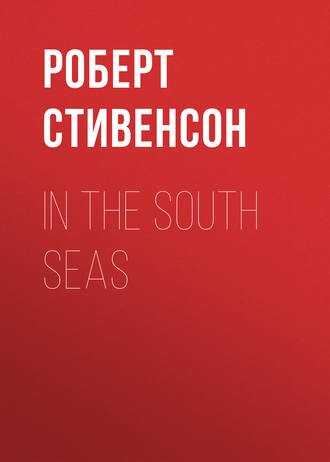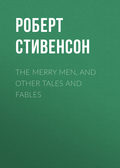
Роберт Льюис Стивенсон
In the South Seas
CHAPTER XIV – IN A CANNIBAL VALLEY
The road from Taahauku to Atuona skirted the north-westerly side of the anchorage, somewhat high up, edged, and sometimes shaded, by the splendid flowers of the flamboyant– its English name I do not know. At the turn of the hand, Atuona came in view: a long beach, a heavy and loud breach of surf, a shore-side village scattered among trees, and the guttered mountains drawing near on both sides above a narrow and rich ravine. Its infamous repute perhaps affected me; but I thought it the loveliest, and by far the most ominous and gloomy, spot on earth. Beautiful it surely was; and even more salubrious. The healthfulness of the whole group is amazing; that of Atuona almost in the nature of a miracle. In Atuona, a village planted in a shore-side marsh, the houses standing everywhere intermingled with the pools of a taro-garden, we find every condition of tropical danger and discomfort; and yet there are not even mosquitoes – not even the hateful day-fly of Nuka-hiva – and fever, and its concomitant, the island fe’efe’e, 3 are unknown.
This is the chief station of the French on the man-eating isle of Hiva-oa. The sergeant of gendarmerie enjoys the style of the vice-resident, and hoists the French colours over a quite extensive compound. A Chinaman, a waif from the plantation, keeps a restaurant in the rear quarters of the village; and the mission is well represented by the sister’s school and Brother Michel’s church. Father Orens, a wonderful octogenarian, his frame scarce bowed, the fire of his eye undimmed, has lived, and trembled, and suffered in this place since 1843. Again and again, when Moipu had made coco-brandy, he has been driven from his house into the woods. ‘A mouse that dwelt in a cat’s ear’ had a more easy resting-place; and yet I have never seen a man that bore less mark of years. He must show us the church, still decorated with the bishop’s artless ornaments of paper – the last work of industrious old hands, and the last earthly amusement of a man that was much of a hero. In the sacristy we must see his sacred vessels, and, in particular, a vestment which was a ‘vraie curiosité,’ because it had been given by a gendarme. To the Protestant there is always something embarrassing in the eagerness with which grown and holy men regard these trifles; but it was touching and pretty to see Orens, his aged eyes shining in his head, display his sacred treasures.
August 26. – The vale behind the village, narrowing swiftly to a mere ravine, was choked with profitable trees. A river gushed in the midst. Overhead, the tall coco-palms made a primary covering; above that, from one wall of the mountain to another, the ravine was roofed with cloud; so that we moved below, amid teeming vegetation, in a covered house of heat. On either hand, at every hundred yards, instead of the houseless, disembowelling paepaes of Nuka-hiva, populous houses turned out their inhabitants to cry ‘Kaoha!’ to the passers-by. The road, too, was busy: strings of girls, fair and foul, as in less favoured countries; men bearing breadfruit; the sisters, with a little guard of pupils; a fellow bestriding a horse – passed and greeted us continually; and now it was a Chinaman who came to the gate of his flower-yard, and gave us ‘Good-day’ in excellent English; and a little farther on it would be some natives who set us down by the wayside, made us a feast of mummy-apple, and entertained us as we ate with drumming on a tin case. With all this fine plenty of men and fruit, death is at work here also. The population, according to the highest estimate, does not exceed six hundred in the whole vale of Atuona; and yet, when I once chanced to put the question, Brother Michel counted up ten whom he knew to be sick beyond recovery. It was here, too, that I could at last gratify my curiosity with the sight of a native house in the very article of dissolution. It had fallen flat along the paepae, its poles sprawling ungainly; the rains and the mites contended against it; what remained seemed sound enough, but much was gone already; and it was easy to see how the insects consumed the walls as if they had been bread, and the air and the rain ate into them like vitriol.
A little ahead of us, a young gentleman, very well tattooed, and dressed in a pair of white trousers and a flannel shirt, had been marching unconcernedly. Of a sudden, without apparent cause, he turned back, took us in possession, and led us undissuadably along a by-path to the river’s edge. There, in a nook of the most attractive amenity, he bade us to sit down: the stream splashing at our elbow, a shock of nondescript greenery enshrining us from above; and thither, after a brief absence, he brought us a cocoa-nut, a lump of sandal-wood, and a stick he had begun to carve: the nut for present refreshment, the sandal-wood for a precious gift, and the stick – in the simplicity of his vanity – to harvest premature praise. Only one section was yet carved, although the whole was pencil-marked in lengths; and when I proposed to buy it, Poni (for that was the artist’s name) recoiled in horror. But I was not to be moved, and simply refused restitution, for I had long wondered why a people who displayed, in their tattooing, so great a gift of arabesque invention, should display it nowhere else. Here, at last, I had found something of the same talent in another medium; and I held the incompleteness, in these days of world-wide brummagem, for a happy mark of authenticity. Neither my reasons nor my purpose had I the means of making clear to Poni; I could only hold on to the stick, and bid the artist follow me to the gendarmerie, where I should find interpreters and money; but we gave him, in the meanwhile, a boat-call in return for his sandal-wood. As he came behind us down the vale he sounded upon this continually. And continually, from the wayside houses, there poured forth little groups of girls in crimson, or of men in white. And to these must Poni pass the news of who the strangers were, of what they had been doing, of why it was that Poni had a boat-whistle; and of why he was now being haled to the vice-residency, uncertain whether to be punished or rewarded, uncertain whether he had lost a stick or made a bargain, but hopeful on the whole, and in the meanwhile highly consoled by the boat-whistle. Whereupon he would tear himself away from this particular group of inquirers, and once more we would hear the shrill call in our wake.
August 27. – I made a more extended circuit in the vale with Brother Michel. We were mounted on a pair of sober nags, suitable to these rude paths; the weather was exquisite, and the company in which I found myself no less agreeable than the scenes through which I passed. We mounted at first by a steep grade along the summit of one of those twisted spurs that, from a distance, mark out provinces of sun and shade upon the mountain-side. The ground fell away on either hand with an extreme declivity. From either hand, out of profound ravines, mounted the song of falling water and the smoke of household fires. Here and there the hills of foliage would divide, and our eye would plunge down upon one of these deep-nested habitations. And still, high in front, arose the precipitous barrier of the mountain, greened over where it seemed that scarce a harebell could find root, barred with the zigzags of a human road where it seemed that not a goat could scramble. And in truth, for all the labour that it cost, the road is regarded even by the Marquesans as impassable; they will not risk a horse on that ascent; and those who lie to the westward come and go in their canoes. I never knew a hill to lose so little on a near approach: a consequence, I must suppose, of its surprising steepness. When we turned about, I was amazed to behold so deep a view behind, and so high a shoulder of blue sea, crowned by the whale-like island of Motane. And yet the wall of mountain had not visibly dwindled, and I could even have fancied, as I raised my eyes to measure it, that it loomed higher than before.
We struck now into covert paths, crossed and heard more near at hand the bickering of the streams, and tasted the coolness of those recesses where the houses stood. The birds sang about us as we descended. All along our path my guide was being hailed by voices: ‘Mikaël – Kaoha, Mikaël!’ From the doorstep, from the cotton-patch, or out of the deep grove of island-chestnuts, these friendly cries arose, and were cheerily answered as we passed. In a sharp angle of a glen, on a rushing brook and under fathoms of cool foliage, we struck a house upon a well-built paepae, the fire brightly burning under the popoi-shed against the evening meal; and here the cries became a chorus, and the house folk, running out, obliged us to dismount and breathe. It seemed a numerous family: we saw eight at least; and one of these honoured me with a particular attention. This was the mother, a woman naked to the waist, of an aged countenance, but with hair still copious and black, and breasts still erect and youthful. On our arrival I could see she remarked me, but instead of offering any greeting, disappeared at once into the bush. Thence she returned with two crimson flowers. ‘Good-bye!’ was her salutation, uttered not without coquetry; and as she said it she pressed the flowers into my hand – ‘Good-bye! I speak Inglis.’ It was from a whaler-man, who (she informed me) was ‘a plenty good chap,’ that she had learned my language; and I could not but think how handsome she must have been in these times of her youth, and could not but guess that some memories of the dandy whaler-man prompted her attentions to myself. Nor could I refrain from wondering what had befallen her lover; in the rain and mire of what sea-ports he had tramped since then; in what close and garish drinking-dens had found his pleasure; and in the ward of what infirmary dreamed his last of the Marquesas. But she, the more fortunate, lived on in her green island. The talk, in this lost house upon the mountains, ran chiefly upon Mapiao and his visits to the Casco: the news of which had probably gone abroad by then to all the island, so that there was no paepae in Hiva-oa where they did not make the subject of excited comment.
Not much beyond we came upon a high place in the foot of the ravine. Two roads divided it, and met in the midst. Save for this intersection the amphitheatre was strangely perfect, and had a certain ruder air of things Roman. Depths of foliage and the bulk of the mountain kept it in a grateful shadow. On the benches several young folk sat clustered or apart. One of these, a girl perhaps fourteen years of age, buxom and comely, caught the eye of Brother Michel. Why was she not at school? – she was done with school now. What was she doing here? – she lived here now. Why so? – no answer but a deepening blush. There was no severity in Brother Michel’s manner; the girl’s own confusion told her story. ‘Elle a honte,’ was the missionary’s comment, as we rode away. Near by in the stream, a grown girl was bathing naked in a goyle between two stepping-stones; and it amused me to see with what alacrity and real alarm she bounded on her many-coloured under-clothes. Even in these daughters of cannibals shame was eloquent.
It is in Hiva-oa, owing to the inveterate cannibalism of the natives, that local beliefs have been most rudely trodden underfoot. It was here that three religious chiefs were set under a bridge, and the women of the valley made to defile over their heads upon the road-way: the poor, dishonoured fellows sitting there (all observers agree) with streaming tears. Not only was one road driven across the high place, but two roads intersected in its midst. There is no reason to suppose that the last was done of purpose, and perhaps it was impossible entirely to avoid the numerous sacred places of the islands. But these things are not done without result. I have spoken already of the regard of Marquesans for the dead, making (as it does) so strange a contrast with their unconcern for death. Early on this day’s ride, for instance, we encountered a petty chief, who inquired (of course) where we were going, and suggested by way of amendment. ‘Why do you not rather show him the cemetery?’ I saw it; it was but newly opened, the third within eight years. They are great builders here in Hiva-oa; I saw in my ride paepaes that no European dry-stone mason could have equalled, the black volcanic stones were laid so justly, the corners were so precise, the levels so true; but the retaining-wall of the new graveyard stood apart, and seemed to be a work of love. The sentiment of honour for the dead is therefore not extinct. And yet observe the consequence of violently countering men’s opinions. Of the four prisoners in Atuona gaol, three were of course thieves; the fourth was there for sacrilege. He had levelled up a piece of the graveyard – to give a feast upon, as he informed the court – and declared he had no thought of doing wrong. Why should he? He had been forced at the point of the bayonet to destroy the sacred places of his own piety; when he had recoiled from the task, he had been jeered at for a superstitious fool. And now it is supposed he will respect our European superstitions as by second nature.
CHAPTER XV – THE TWO CHIEFS OF ATUONA
It had chanced (as the Casco beat through the Bordelais Straits for Taahauku) she approached on one board very near the land in the opposite isle of Tauata, where houses were to be seen in a grove of tall coco-palms. Brother Michel pointed out the spot. ‘I am at home now,’ said he. ‘I believe I have a large share in these cocoa-nuts; and in that house madame my mother lives with her two husbands!’ ‘With two husbands?’ somebody inquired. ‘C’est ma honte,’ replied the brother drily.
A word in passing on the two husbands. I conceive the brother to have expressed himself loosely. It seems common enough to find a native lady with two consorts; but these are not two husbands. The first is still the husband; the wife continues to be referred to by his name; and the position of the coadjutor, or pikio, although quite regular, appears undoubtedly subordinate. We had opportunities to observe one household of the sort. The pikio was recognised; appeared openly along with the husband when the lady was thought to be insulted, and the pair made common cause like brothers. At home the inequality was more apparent. The husband sat to receive and entertain visitors; the pikio was running the while to fetch cocoa-nuts like a hired servant, and I remarked he was sent on these errands in preference even to the son. Plainly we have here no second husband; plainly we have the tolerated lover. Only, in the Marquesas, instead of carrying his lady’s fan and mantle, he must turn his hand to do the husband’s housework.
The sight of Brother Michel’s family estate led the conversation for some while upon the method and consequence of artificial kinship. Our curiosity became extremely whetted; the brother offered to have the whole of us adopted, and some two days later we became accordingly the children of Paaaeua, appointed chief of Atuona. I was unable to be present at the ceremony, which was primitively simple. The two Mrs. Stevensons and Mr. Osbourne, along with Paaaeua, his wife, and an adopted child of theirs, son of a shipwrecked Austrian, sat down to an excellent island meal, of which the principal and the only necessary dish was pig. A concourse watched them through the apertures of the house; but none, not even Brother Michel, might partake; for the meal was sacramental, and either creative or declaratory of the new relationship. In Tahiti things are not so strictly ordered; when Ori and I ‘made brothers,’ both our families sat with us at table, yet only he and I, who had eaten with intention were supposed to be affected by the ceremony. For the adoption of an infant I believe no formality to be required; the child is handed over by the natural parents, and grows up to inherit the estates of the adoptive. Presents are doubtless exchanged, as at all junctures of island life, social or international; but I never heard of any banquet – the child’s presence at the daily board perhaps sufficing. We may find the rationale in the ancient Arabian idea that a common diet makes a common blood, with its derivative axiom that ‘he is the father who gives the child its morning draught.’ In the Marquesan practice, the sense would thus be evanescent; from the Tahitian, a mere survival, it will have entirely fled. An interesting parallel will probably occur to many of my readers.
What is the nature of the obligation assumed at such a festival? It will vary with the characters of those engaged, and with the circumstances of the case. Thus it would be absurd to take too seriously our adoption at Atuona. On the part of Paaaeua it was an affair of social ambition; when he agreed to receive us in his family the man had not so much as seen us, and knew only that we were inestimably rich and travelled in a floating palace. We, upon our side, ate of his baked meats with no true animus affiliandi, but moved by the single sentiment of curiosity. The affair was formal, and a matter of parade, as when in Europe sovereigns call each other cousin. Yet, had we stayed at Atuona, Paaaeua would have held himself bound to establish us upon his land, and to set apart young men for our service, and trees for our support. I have mentioned the Austrian. He sailed in one of two sister ships, which left the Clyde in coal; both rounded the Horn, and both, at several hundred miles of distance, though close on the same point of time, took fire at sea on the Pacific. One was destroyed; the derelict iron frame of the second, after long, aimless cruising, was at length recovered, refitted, and hails to-day from San Francisco. A boat’s crew from one of these disasters reached, after great hardships, the isle of Hiva-oa. Some of these men vowed they would never again confront the chances of the sea; but alone of them all the Austrian has been exactly true to his engagement, remains where he landed, and designs to die where he has lived. Now, with such a man, falling and taking root among islanders, the processes described may be compared to a gardener’s graft. He passes bodily into the native stock; ceases wholly to be alien; has entered the commune of the blood, shares the prosperity and consideration of his new family, and is expected to impart with the same generosity the fruits of his European skill and knowledge. It is this implied engagement that so frequently offends the ingrafted white. To snatch an immediate advantage – to get (let us say) a station for his store – he will play upon the native custom and become a son or a brother for the day, promising himself to cast down the ladder by which he shall have ascended, and repudiate the kinship so soon as it shall grow burdensome. And he finds there are two parties to the bargain. Perhaps his Polynesian relative is simple, and conceived the blood-bond literally; perhaps he is shrewd, and himself entered the covenant with a view to gain. And either way the store is ravaged, the house littered with lazy natives; and the richer the man grows, the more numerous, the more idle, and the more affectionate he finds his native relatives. Most men thus circumstanced contrive to buy or brutally manage to enforce their independence; but many vegetate without hope, strangled by parasites.
We had no cause to blush with Brother Michel. Our new parents were kind, gentle, well-mannered, and generous in gifts; the wife was a most motherly woman, the husband a man who stood justly high with his employers. Enough has been said to show why Moipu should be deposed; and in Paaaeua the French had found a reputable substitute. He went always scrupulously dressed, and looked the picture of propriety, like a dark, handsome, stupid, and probably religious young man hot from a European funeral. In character he seemed the ideal of what is known as the good citizen. He wore gravity like an ornament. None could more nicely represent the desired character as an appointed chief, the outpost of civilisation and reform. And yet, were the French to go and native manners to revive, fancy beholds him crowned with old men’s beards and crowding with the first to a man-eating festival. But I must not seem to be unjust to Paaaeua. His respectability went deeper than the skin; his sense of the becoming sometimes nerved him for unexpected rigours.
One evening Captain Otis and Mr. Osbourne were on shore in the village. All was agog; dancing had begun; it was plain it was to be a night of festival, and our adventurers were overjoyed at their good fortune. A strong fall of rain drove them for shelter to the house of Paaaeua, where they were made welcome, wiled into a chamber, and shut in. Presently the rain took off, the fun was to begin in earnest, and the young bloods of Atuona came round the house and called to my fellow-travellers through the interstices of the wall. Late into the night the calls were continued and resumed, and sometimes mingled with taunts; late into the night the prisoners, tantalised by the noises of the festival, renewed their efforts to escape. But all was vain; right across the door lay that god-fearing householder, Paaaeua, feigning sleep; and my friends had to forego their junketing. In this incident, so delightfully European, we thought we could detect three strands of sentiment. In the first place, Paaaeua had a charge of souls: these were young men, and he judged it right to withhold them from the primrose path. Secondly, he was a public character, and it was not fitting that his guests should countenance a festival of which he disapproved. So might some strict clergyman at home address a worldly visitor: ‘Go to the theatre if you like, but, by your leave, not from my house!’ Thirdly, Paaaeua was a man jealous, and with some cause (as shall be shown) for jealousy; and the feasters were the satellites of his immediate rival, Moipu.
For the adoption had caused much excitement in the village; it made the strangers popular. Paaaeua, in his difficult posture of appointed chief, drew strength and dignity from their alliance, and only Moipu and his followers were malcontent. For some reason nobody (except myself) appears to dislike Moipu. Captain Hart, who has been robbed and threatened by him; Father Orens, whom he has fired at, and repeatedly driven to the woods; my own family, and even the French officials – all seemed smitten with an irrepressible affection for the man. His fall had been made soft; his son, upon his death, was to succeed Paaaeua in the chieftaincy; and he lived, at the time of our visit, in the shoreward part of the village in a good house, and with a strong following of young men, his late braves and pot-hunters. In this society, the coming of the Casco, the adoption, the return feast on board, and the presents exchanged between the whites and their new parents, were doubtless eagerly and bitterly canvassed. It was felt that a few years ago the honours would have gone elsewhere. In this unwonted business, in this reception of some hitherto undreamed-of and outlandish potentate – some Prester John or old Assaracus – a few years back it would have been the part of Moipu to play the hero and the host, and his young men would have accompanied and adorned the various celebrations as the acknowledged leaders of society. And now, by a malign vicissitude of fortune, Moipu must sit in his house quite unobserved; and his young men could but look in at the door while their rivals feasted. Perhaps M. Grévy felt a touch of bitterness towards his successor when he beheld him figure on the broad stage of the centenary of eighty-nine; the visit of the Casco which Moipu had missed by so few years was a more unusual occasion in Atuona than a centenary in France; and the dethroned chief determined to reassert himself in the public eye.
Mr. Osbourne had gone into Atuona photographing; the population of the village had gathered together for the occasion on the place before the church, and Paaaeua, highly delighted with this new appearance of his family, played the master of ceremonies. The church had been taken, with its jolly architect before the door; the nuns with their pupils; sundry damsels in the ancient and singularly unbecoming robes of tapa; and Father Orens in the midst of a group of his parishioners. I know not what else was in hand, when the photographer became aware of a sensation in the crowd, and, looking around, beheld a very noble figure of a man appear upon the margin of a thicket and stroll nonchalantly near. The nonchalance was visibly affected; it was plain he came there to arouse attention, and his success was instant. He was introduced; he was civil, he was obliging, he was always ineffably superior and certain of himself; a well-graced actor. It was presently suggested that he should appear in his war costume; he gracefully consented; and returned in that strange, inappropriate and ill-omened array (which very well became his handsome person) to strut in a circle of admirers, and be thenceforth the centre of photography. Thus had Moipu effected his introduction, as by accident, to the white strangers, made it a favour to display his finery, and reduced his rival to a secondary rôle on the theatre of the disputed village. Paaaeua felt the blow; and, with a spirit which we never dreamed he could possess, asserted his priority. It was found impossible that day to get a photograph of Moipu alone; for whenever he stood up before the camera his successor placed himself unbidden by his side, and gently but firmly held to his position. The portraits of the pair, Jacob and Esau, standing shoulder to shoulder, one in his careful European dress, one in his barbaric trappings, figure the past and present of their island. A graveyard with its humble crosses would be the aptest symbol of the future.
We are all impressed with the belief that Moipu had planned his campaign from the beginning to the end. It is certain that he lost no time in pushing his advantage. Mr. Osbourne was inveigled to his house; various gifts were fished out of an old sea-chest; Father Orens was called into service as interpreter, and Moipu formally proposed to ‘make brothers’ with Mata-Galahi – Glass-Eyes, – the not very euphonious name under which Mr. Osbourne passed in the Marquesas. The feast of brotherhood took place on board the Casco. Paaaeua had arrived with his family, like a plain man; and his presents, which had been numerous, had followed one another, at intervals through several days. Moipu, as if to mark at every point the opposition, came with a certain feudal pomp, attended by retainers bearing gifts of all descriptions, from plumes of old men’s beard to little, pious, Catholic engravings.
I had met the man before this in the village, and detested him on sight; there was something indescribably raffish in his looks and ways that raised my gorge; and when man-eating was referred to, and he laughed a low, cruel laugh, part boastful, part bashful, like one reminded of some dashing peccadillo, my repugnance was mingled with nausea. This is no very human attitude, nor one at all becoming in a traveller. And, seen more privately, the man improved. Something negroid in character and face was still displeasing; but his ugly mouth became attractive when he smiled, his figure and bearing were certainly noble, and his eyes superb. In his appreciation of jams and pickles, in is delight in the reverberating mirrors of the dining cabin, and consequent endless repetition of Moipus and Mata-Galahis, he showed himself engagingly a child. And yet I am not sure; and what seemed childishness may have been rather courtly art. His manners struck me as beyond the mark; they were refined and caressing to the point of grossness, and when I think of the serene absent-mindedness with which he first strolled in upon our party, and then recall him running on hands and knees along the cabin sofas, pawing the velvet, dipping into the beds, and bleating commendatory ‘mitais’ with exaggerated emphasis, like some enormous over-mannered ape, I feel the more sure that both must have been calculated. And I sometimes wonder next, if Moipu were quite alone in this polite duplicity, and ask myself whether the Casco were quite so much admired in the Marquesas as our visitors desired us to suppose.
I will complete this sketch of an incurable cannibal grandee with two incongruous traits. His favourite morsel was the human hand, of which he speaks to-day with an ill-favoured lustfulness. And when he said good-bye to Mrs. Stevenson, holding her hand, viewing her with tearful eyes, and chanting his farewell improvisation in the falsetto of Marquesan high society, he wrote upon her mind a sentimental impression which I try in vain to share.







